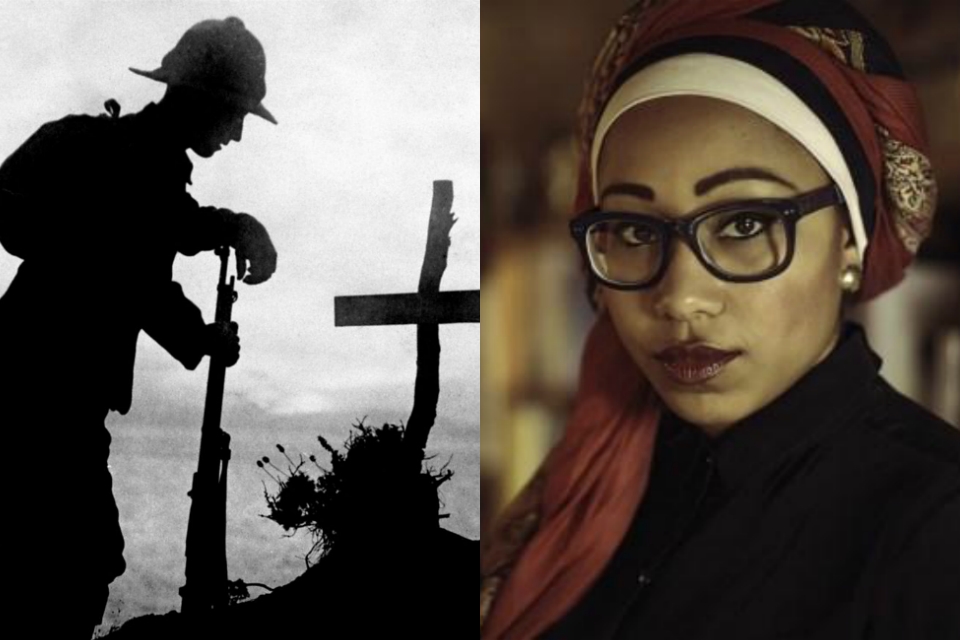By
Rupen Savoulian
Professor Michelle Grattan, journalist and expert commentator on Australian politics at the University of Canberra, wrote an article regarding the ruckus that erupted around the Anzac Day comment of Australian Broadcasting Corporation (ABC) presenter Yassmin Abdel-Magied.
Grattan’s article, entitled ‘Abdel-Magied Anzac row is a storm over not much’, summarises the main details of the recent controversy. The annual public holiday in Australia commemorates the first day of the ultimately catastrophic landing of a coalition of Australian, New Zealander, British and French troops at the Gallipoli peninsula. The commemorations on Anzac day have long since surpassed their purpose as a day of thoughtful reflection about the Australian veterans and their sacrifices. They have instead become a focal point for a celebration of militarist adventures in which Australian troops have participated.
The ABC presenter and journalist, Yassmin Abdel-Magied, referencing these Anzac day remembrances, posted a Facebook comment (since deleted) stating “Lest. We. Forget. (Manus, Nauru, Syria, Palestine …).“
Abdel-Magied was suggesting, in her Facebook post, that we may also reflect on the current suffering of people such as the refugees locked away in remote detention camps on Nauru and Manus island. She was not disrespecting or ignoring the Anzacs, but inviting the readers to consider the plight of those victims of war who are still suffering for their experiences. Drawing a connection to current events is nothing controversial in and of itself.
Prime Minister Malcolm Turnbull, and his associated colleagues and co-thinkers on the conservative Right, explicitly make a connection between the Anzacs and today’s Australian servicemen and women currently participating in a number of imperial wars overseas. When participating in Anzac commemorations on April 25, Turnbull drew a direct line between the Anzac troops, and the current war drive of American imperialist power, visiting Iraq and Afghanistan. Australian troops currently serve as auxiliary forces for the United States in those conflicts. Turnbull provided an open-ended commitment to these wars, and stated that:
“More than 100,000 men and women have died in the service of our nation. Many more have been left wounded in body and spirit. Their sacrifice has protected our liberty and our values. And their legacy continues in the work of those who serve today.”
Turnbull, during this tightly-controlled lightning visit to Iraq and Afghanistan, made no examination of why Australian troops are helping in these American-led wars, participating in propping up the neo-colonial occupations of these nations. The Afghanistan war is now the longest running conventional war for the United States military, currently in its 16th year.
Abdel-Magied was inviting her readers to consider other aspects of the vast experience that is war and human suffering. Binoy Kampmark, lecturer at the School of Global, Urban and Social Studies at RMIT University, stated that we reflect on human suffering and sacrifice on Anzac day, let us not exclude considerations of the political calculations and decisions made to send those troops to wars overseas in the furtherance of imperial objectives. He writes that:
What the Anzac Day ceremonies do not do is reflect upon political folly and irresponsibility. This is the event’s greatest triumph — that of political deflection. Human sacrifice is the enormous tent under which political blunders and military catastrophes are subsumed, negating any questioning about decisions made and engagements undertaken in conflict.
Gallipoli in 1915 was a defeat of monumental proportions for the Anzac soldiers, a needless slaughter born from a Churchillian gamble. Editors and politicians chose to see it differently, finding in murderous folly a “baptism of fire”. Importantly, it was an invasion of the Ottoman Empire, a violation of sovereignty that has somehow been lost in the annals of saccharine reflection.
The Anzac Day celebrations have been virtually turned into a secular religion, and journalists and politicians are transformed into votaries of that particular tribal devotion. Commemorate the dead on Anzac Day to be sure; but let us not fall into the practice of Anzackery, an almost devotional, excessively over-the-top worship of the alleged ‘baptism of fire’ that Australian troops experienced at Gallipoli. This kind of patriotic mysticism, while comforting, blinds us to the deliberate calculations of the imperialist powers that led to the sacrifice of so many lives on the battlefields.
Abdel-Magied was not hijacking a ‘sacred cause’ or trying to divert attention from a worthy subject. She was emphasising that we must remember those who were forcibly displaced by imperialist wars, and indeed we must address the real suffering of the refugees created by today’s wars. As David Stephens wrote in The Guardian newspaper:
When you think about it, though, what better day than 25 April to raise important issues such as the fate of refugees in hell-holes? We are told that the men of Anzac a century ago – and servicemen and women since – were fighting to defend our values. So why not bring out some values along with the medals, some things we care deeply about?
The reaction to Abdel-Magied’s comment was vitriolic and abusive; government figures have been demanding her sacking from the ABC. Online petitions have been created to pressure the authorities to ‘do something’ about Abdel-Magied. She has since apologised for the Facebook comment and deleted it, but the hysteria continues. Jane Gilmore, writing in the Sydney Morning Herald, stated that the scathing reaction to her post cannot be understood without taking into action racism. Abdel-Magied, a black Muslim woman, is an articulate and intelligent commentator, speaking up against the current crop of conservative white male politicians in the federal cabinet.
Gilmore wrote that:
It’s impossible to separate reactions to Yassmin’s post from her public identity as a young woman of colour, a Muslim, and the combination of those selves in a person who passionately defends Islam when we are indoctrinated to fear and hate it above all else. And it would be naive to the point of delusional to think this plays no part in the weight of the rage that has settled upon her.
Other writers and journalists have written critical commentaries about Anzac day celebrations – Stan Grant, indigenous journalist, has written about how those from the First Nations of Australia who served in the Australian army have been ignored and disrespected, their contribution to Australian wars almost airbrushed out of official historical commemorations. It took long and persistent battles by the indigenous community to have their contribution recognised. Grant has not been on the receiving end of venomous attacks in the way Abdel-Magied has been.
We would also do well to remember, on the day of remembering the Anzac day landings, that during World War One, there were those Australians who fought on the home front to stop participation in the mutual slaughter of Europe. Claire Wright, associate professor of history at La Trobe University, wrote that the issue of the Great War was deeply divisive at the time, with Australian politics being torn asunder. There were huge political battles fought over the proposed introduction of conscription – the Australian government at the time was defeated on that measure.
Wright elaborated that:
The enduring legacies of the first world war emanate beyond the battlefields of Gallipoli, manifested not only in the “shattered Anzacs” whose families bore the burden of care, but also in the class and sectarian divisions that shaped Australia’s social and political relations in the 20th century.
Lest we also forget that the democratic freedoms we hold dear today – freedom of the press, freedom of assembly, freedom of speech — were won in battles fought on home soil by courageous women and men who sacrificed much, but are still accorded little recognition.
Let us assume, just for the moment, that Abdel-Magied was mistaken. If that is the case, then her critics are even worse, and appear downright vicious and atrociously narrow-minded. Madonna King, writing in the Brisbane Times, stated that even if Abdel-Magied’s comment was out of line, then the racist and sexist abuse hurled at her are appalling. It only demonstrated that the supposed partisans of free speech will uphold that right when you agree with them. Let us be mature enough to have a debate about the Anzac Day without it degenerating into a hysterical typhoon of abuse.
Back in 2015, this is what I contributed about reflections on Anzac Day. I stand by it until today.



No Comments Yet!
You can be first to comment this post!